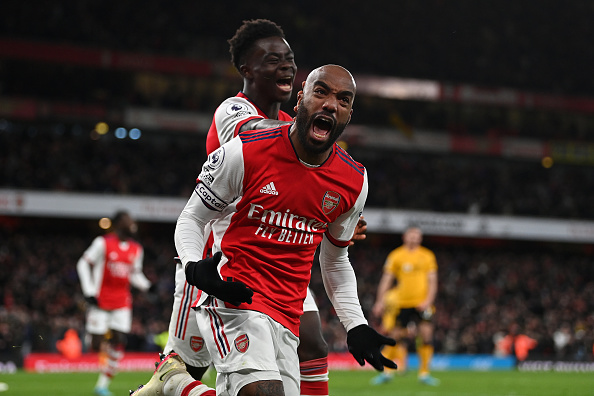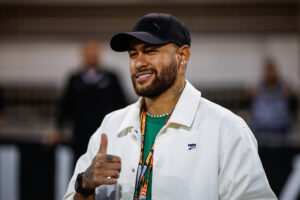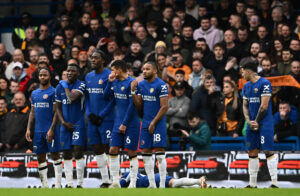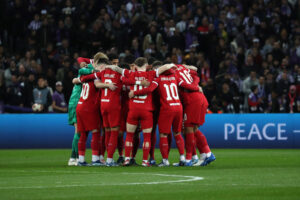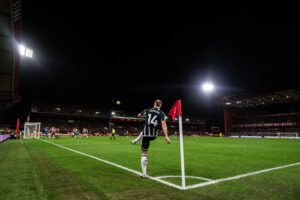For some older Arsenal fans, watching the Gunners play a match on the same day that Russia invaded Ukraine would have evoked painful memories of 9/11, when Arsenal played Mallorca in the Champions League and unsurprisingly lost a match that should probably never have gone ahead. This time around at least, Arsenal fans could celebrate victory, as their team came from a goal down against Wolves to score two very late goals themselves and win a match completely overshadowed by world historical events.
Arsenal Survive Wolves Scare to Strengthen Top Four Hopes
The Two Wolves Games are the Closest Arsenal Will Get to a European Tie This Season
Because Arsenal failed to qualify for any form of European competition this season, playing Wolves in quick succession on two Thursday nights will be the closest that the Gunners get to a European tie this season. That impression was only strengthened by facing a Wolves team largely made up of Portuguese imports, who looked set for a classic away win after scoring early and then defending resolutely and counter-attacking when they could for the rest of the game.
Indeed, for a long time it looked as if the “home” leg of the two matches would provide a reversal of the result from the first game at Molyneux two weeks ago, when Gabriel had scored a fairly scruffy first half goal and then played a central part – literally – in Arsenal’s successful rearguard action, especially after Gabriel Martinelli was sent off. Last night at The Emirates, however, Arsenal’s hero from the first game threatened to become the villain of the second, as his careless back pass to Aaron Ramsdale was cut out by Hwang Hee-Chan, the South Korean striker who is one of Wolves’s few non-Portuguese imports. He promptly rounded the stranded Arsenal goalkeeper to give Wolves the lead.
It’s Never Easy Playing the Same Team Twice (or More) in Quick Succession
It is never easy playing the same team twice (or more) in quick succession, as both sides can become accustomed to each other’s tactics and personnel. It is also an increasingly rare occurrence these days, now that FA Cup replays have been banned (at least for this season) and there is certainly no chance now of any English team, let alone one in the top flight, playing the remarkable five successive matches that Arsenal played against Sheffield Wednesday in the FA Cup third round in 1979, an epic series of encounters that was ultimately made worthwhile when Arsenal won the final against Manchester United later that season.
For long periods against Wolves at The Emirates, Arsenal looked like a team that had been rumbled by their opponents, who were already fired up after the first match between the teams by what they felt were excessive Arsenal celebrations at the end of that game. Consequently, with Ruben Neves and João Moutinho largely dominating Thomas Partey and Granit Xhaka in midfield, it seemed that the best that Arsenal could hope for was to somehow scrape a late draw.
That impression was only strengthened by the relative weakness of the Arsenal bench, where the only attacking options available to Mikel Arteta were Nicolas Pepe and Eddie Nketiah, the winger who has been Arsenal’s underwhelming record signing (in fact, he’s been so underwhelming that he is arguably the worst ever record signing by any major English club) and the young, slight striker who has proved that he can score in the League Cup but so far failed to prove that he can score in any other competition.
Given that the departed Pierre-Emerick Aubameyang was scoring a fourth goal in two games for Barcelona, following up his hat-trick in La Liga last weekend against Valencia with a Europa League goal against Napoli, at exactly the same time that Arsenal’s faltering attack was failing to score a goal of any kind against Wolves, the pressure was undoubtedly on Arteta and his misfiring forwards. Yet the Spaniard’s apparently unwavering support for Pepe and Nketiah was finally vindicated, as Nketiah set up Pepe’s 82nd-minute equaliser and then Pepe helped to set up Alexandre Lacazette to score the winner, via the Wolves keeper Jose Sa (the goal was eventually defined as an own-goal).
Arteta’s Arsenal are More George Graham Than Arsène Wenger
Winning so late on against Wolves also added to the growing impression that, at least in this early stage of their development, Mikel Arteta’s evolving Arsenal side are definitely more akin to the teams of George Graham than those of Arsène Wenger. That is most evident in the increasing defensive solidity, even certainty, of the back five (including the goalkeeper, the continually impressive Ramsdale). Although Gabriel was at fault for the Wolves goal, he recovered well to play his part in largely shutting out Raul Jimenez on his return to The Emirates after his horrendous head injury nearly 18 months ago.
For the first time in what feels like forever (or at least 15 years), it finally feels as if Arsenal have a defence that will not collapse at the first sight of an opposing striker of quality, which Jimenez undoubtedly is. In preventing the Mexican from scoring in either of the two games between the teams, Gabriel and Ben White, ably supported by Kieran Tierney and Cedric Soares at full-back, continued to suggest that they might just be Arsenal’s best central defensive pairing since Kolo Touré and Sol Campbell were the basis of the Invincibles team nearly 20 years ago.
However, there are other ways in which Arteta’s Arsenal are also more Graham than Wenger in style and outlook. On the negative side, the holding midfield pairing of Partey and Xhaka continue to lack both the creative guile and goal-scoring ability of many opposing midfield pairings, such as Neves and Moutinho. On the plus side, Arteta’s relatively small but obviously tightly knit squad, which is largely made up of young players, is beginning to evoke memories of the last great largely homegrown Arsenal team, that of Graham in the late 1980s and early 1990s, with Bukayo Saka, Gabriel Martinelli and Emile Smith Rowe (who missed the second Wolves game through illness) evoking fond memories for older Gooners of the likes of David Rocastle, Michael Thomas and Paul Merson.
Most importantly, however, Arteta’s Arsenal side seem to be recovering at least a little of the never-say-die attitude of the greatest George Graham sides, an attitude embodied in the famous “One Nil Down, Two-One Up” scoreline that first became famous in the legendary League Cup semi-final triumph over Spurs in 1987 and which was thrillingly replicated against Wolves last night, with Sa’s own goal coming in the 95th minute.
It is that never-say-die attitude that is arguably the most important attribute that any football team, or indeed any sporting team of any kind, can have. By the end of both the Graham and the Wenger reigns at Arsenal, it had been misplaced, if not lost altogether. The fact that Arteta’s new, young, hungry Arsenal seem to have it is probably the single biggest reason for Arsenal fans to continue dreaming of Champions League qualification.
Main Photo
Embed from Getty Images


